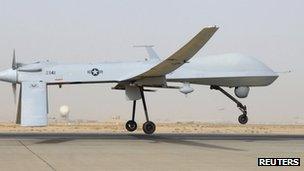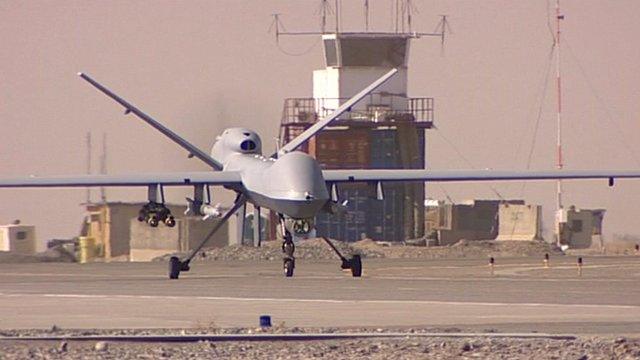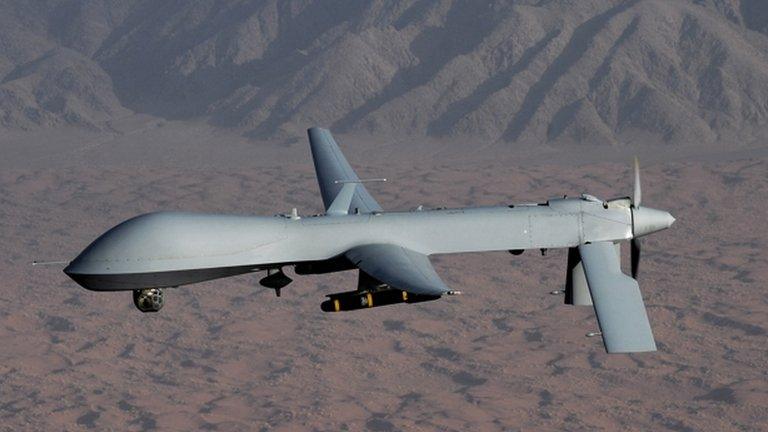Drones at the forefront of the Brennan hearing
- Published
- comments

One study estimates as many as 3,200 have been killed by drone attacks in Pakistan alone
Thursday's Senate confirmation hearing will be, in popular mythology at least, a brief moment when light flashes into the darkness.
John Brennan hopes to make his way from his windowless office (bunker, if you like a bit of drama) in the White House where he is President Barack Obama's counter-terrorism chief to Langley, in the state of Virginia, where he hopes to occupy the director's office in the CIA.
He will be at home in Langley: Mr Brennan spent 25 of his 57 years working for the Agency. He is an Arabist, was station chief in Saudi Arabia in the 90s and chief of staff to Director George Tenet in the years after 9/11.
After time in the private sector during president George W Bush's second term, he was tipped to be Mr Obama's nominee to lead the CIA in 2009.
But his time with Mr Tenet, and the CIA's involvement in what the administration called "enhanced interrogation" but what much of the rest of world saw as torture, put an end to that.
Instead he has laboured in the shadows in the White House, hugely influential, as a president who picked up a Nobel Peace Prize on pretty much his first day in office has expanded the programme of drone-killing with an aggression that has surprised friends and enemies alike.
Drones in the spotlight
It is that drone programme, acknowledged by the US government but never detailed, that will fall under the Senate spotlight. And it will be Mr Brennan's role in the expansion and running of it that will be up for examination.
The hearing comes as the use of unmanned aerial combat vehicles to winnow the ranks of America's enemies is attracting unprecedented domestic attention.
On Tuesday came the leak to NBC News, external of the justice department's white paper giving its legal justification for killing an American citizen.
It is widely believed to be the briefing paper given to members of Congress in the light of the drone-killing of Anwar al-Awlaki, a US citizen killed in Yemen in September 2011.
On Wednesday came the news - apparently long-known to some parts of the US media, who chose not share it - that the US is operating a drone base out of Saudi Arabia.
And drones are on the front page of the magazines Time and New York Review of Books.
Much of America's drone operation is hidden from view, carried out by the CIA and thus away from public gaze and accountability.
The New America Foundation estimates, external that between 1,953 and 3,279 have been killed by drone attacks in Pakistan alone, of whom roughly one in 10 were civilians.
Mr Brennan is believed to have been at the heart of trying to formalise the rules of this new war through the creation of a "playbook": a set of criteria and methods for how decisions of life and death should be made.
The organisation he hopes to lead will not, however, be bound by the playbook.
Unanswered questions
"Why not?" asks Georgetown University Professor of Law David Cole, in the New York Review of Books, external.
How, he asks, does the administration decide whether or not capturing an enemy (rather than killing them) is feasible? What are the criteria for targeted killing? Just how many civilians have been killed?
The questions roll on.
How much we will learn from the Senate hearing is difficult to guess. Senators have received many confidential briefings.
They are often shy of talking about national security matters. The hearings themselves can descend swiftly into publicity seeking and point scoring, rather than probing questioning.
In a speech last year, external, Mr Brennan acknowledged that many questions have yet to be answered about the drone programme - questions much like the ones posed by Mr Cole.
But he said that in amongst the struggle over the moral questions thrown up by the drone programme, he was certain about one thing:
"We are at war. We are at war against a terrorist organisation called al-Qaeda that has brutally murdered thousands of Americans… with the help of targeted strikes, we have turned al-Qaeda into a shadow of what it once was. They are on the road to destruction."
There are many questions to be asked as Mr Brennan makes his way from one dark corner of the administration to another. But for most Americans, Mr Brennan's words sum up all they want to know about the war being played out in the shadows.
- Published6 February 2013

- Published5 February 2013
